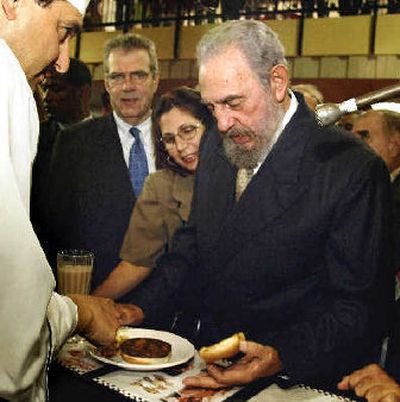Cuban embargo criticized

HAVANA — American liberals have long criticized the U.S. government for maintaining a Cold War-era embargo against communist Cuba. But these days, conservative American farmers, businessmen and some Republican lawmakers are just as likely to oppose the U.S. policy limiting trade with the island.
As Congress voted down amendments to the policy last week, those pushing for more interaction with Cuba questioned how the embargo can endure.
“Will someone please explain this policy to me?” Dwight A. Roberts, the Texan president of the U.S. Rice Producers Association, asked a recent news conference in Havana after describing financial losses to thousands of rice growers when U.S. restrictions were tightened.
U.S. food and agricultural products can be sold to Cuba on a cash-only basis under an exception to the embargo created in 2000. But a new U.S. rule adopted this year makes Cuba pay for goods in full before the cargo leaves U.S. ports, forcing the island to seek other markets and harming American business, Roberts said.
This year, he said, the association will sell less than a third of the rice it exported to Cuba in 2004.
“The policy just doesn’t make sense,” said Roberts, who visited Cuba in late June with the U.S.-Cuba Trade Association seeking normalized trade relations between the two countries.
Critics say the embargo, aimed at forcing a change in Cuba’s leadership, is outdated and hasn’t worked. President Fidel Castro remains in power and the nation is still communist.
Kirby Jones, the trade association’s president, likened the embargo, dating to the early 1960s, to a weighty, out-of-commission ship on a field.
“It’s like a tanker that has been sitting there for 40 years,” Jones said. “And you’ve got farmers pushing it, but it won’t budge. It’s entrenched.”
U.S. officials defend the policy, saying unfettered trade and travel to the island would prop up Castro’s government. The imprisonment of dissidents and restrictions on economic and political freedoms are also used to justify the embargo.
But critics note the United States trades with other communist countries, such as China and Vietnam, and say the policy hurts average Cubans more than Castro.
They also maintain the restrictions thrive largely because of support from powerful Cuban-American lobbyists and lawmakers in South Florida.
Many lost property when they fled Cuba and hold Castro responsible. Several Cuban-American organizations focus on overthrowing his government, and four U.S. Congress members are Cuban-Americans who fiercely oppose the island’s communist system.
“How can we think about easing restrictions against this monster when he continues to plunder and terrorize 11 million of our brothers and sisters?” U.S. Representative Ileana Ros-Lehtinen asked in a statement applauding last week’s House vote. “The Congress should not be making life easier for the brutal Castro regime.”
Two House members are even linked to Castro through family — the aunt of U.S. Representatives Lincoln and Mario Diaz-Balart was the Cuban leader’s first wife.
“This is a family feud that’s been taken to a very personal level,” said Pamela Ann Martin, a Pennsylvania-based trade consultant specializing in Cuba.
Some U.S. policy critics say the Cuban-Americans in Congress pressure lawmakers who support easing the embargo — an idea Ros-Lehtinen rejects.
“We humbly and gently ask our congressional colleagues to vote with us and for freedom for the Cuban people,” she said in a statement e-mailed to the Associated Press.